
Trek Pakistan's Nangma Valley and Karakoram Mountains Itinerary
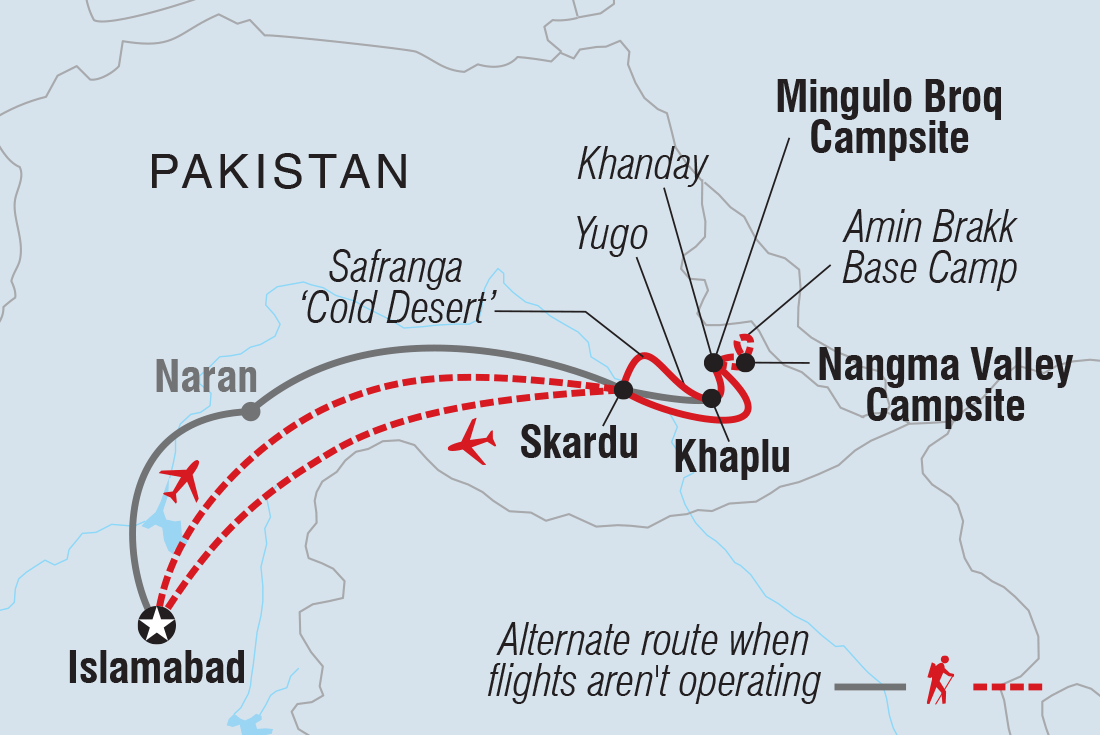


Khush Aamadid! Welcome to Islamabad. When you arrive at the Islamabad International Airport, you’ll be met by a local representative and taken to your hotel. If you arrive early, you can join your leader and group for lunch and a city tour visiting Lok Virsa Museum and Shah Faisal Mosque this afternoon. Back at the hotel, you’ll meet up with everyone again for a welcome meeting at 3pm to get all the details on your upcoming trek. After, relax, explore or find a good spot for dinner.
First things first, you’ll check the weather – if it’s good, you’ll fly from Islamabad to Skardu (a short, scenic flight). If the weather isn’t cooperating, you’ll instead make the trip via the Karakoram Highway, making stops along the way among mountain peaks that humans are yet to have stepped a foot on. In Skardu – the gateway to the Karakoram Mountain Range – you’ll have some free time to explore and pick up any snacks or souvenirs that might be calling your name from the Skardu Bazaar. You'll also have the chance to rent any hiking gear here that you may have forgotten to pack. Time permitting while in Skardu, check out the Manthal Rock Buddha, Kharpocho Fort and Nansoq Organic Village.
Carry on into the mountains as you drive to Khaplu, passing through the small villages of the Ghanche district. Along the way, stop where the Shayok and Indus Rivers meet. Visit the small village of Yugo and enjoy lunch and a cultural village walk where you’ll get a feel for village life and meet some locals. This afternoon, travel on to Khaplu – the Ghanche district’s capital city. After checking into your hotel, enjoy some free time to explore. Maybe see the Khaplu Fort Museum and the organic garden.
After breakfast, drive from Khaplu to Kanday Village (2680 m/8793 ft) – the trailhead for your trek into Nangma Valley – and meet your local support crew of guides, porters and camp cooks. The first leg is short but with a few steep parts. From Kanday, descend to cross a wooden bridge over the Hushe River, then ascend through the narrow valley across two suspension bridges to the Mingulo Broq campsite. This lush site near the water is surrounded by willow trees and is also a local pasture, so you’ll likely get the chance to meet a few local shepherds. After lunch at the campsite, you’ll have time to explore nature or relax at camp. For dinner, your kitchen team will prepare local Balti cuisine, like balay (soup), chapshoro (cooked minced meat stuffed and sealed between two whole wheat flatbreads, cooked over a skillet) and other Pakistani dishes. This evening, enjoy a live music and dance show by local Balti performers. Feel free to join in! Before sliding into your sleeping bag, be sure to turn your gaze upwards and take in the star-filled night sky.
Fuel up on a hot breakfast, then carry on from Mingulo Broq to Nangma Valley, passing through lush green fields alongside a glacial stream. Today’s trek is relatively flat, crossing over one stream and through another. You’ll arrive at the Nangma Valley campsite by lunch, where you can tuck into a fresh, hot meal. Enjoy some free time to take in the incredible views – looking out over the valley, you’ll see the North Ridge of Shingu Charpa. For dinner, tuck into another hot meal of local soup and a mix of regional and continental Chinese and Pakistani dishes.
Check in with your feet this morning and decide how you’d like to spend the day. Opt to take a day hike to Amin Brakk base camp (4590 m/15058 ft), at the base of the towering rock face that’s known as one of the most spectacular climbs in the world. Start with a steep climb and continue on a relatively flat plateau, before the final, steep push through a rocky trail. You will either cross a water stream or take an alternate path that involves climbing over stones and boulders. While at the base camp, enjoy some free time for your own exploration before tucking in to refreshments and tracking your own steps back to Nangma campsite. Or if you’d rather lay low, choose to kick back and relax at camp. Either way, you won’t want to miss the sunrise from up here. If you choose to stick close to camp for the day, test your scrambling skills on nearby rocks or go on a scavenger hunt for local Karakoram bird and flower species.
Make the trek back down to Kanday this morning and enjoy a traditional lunch with a local family in the village. You and your group will travel by road back to Skardu this afternoon, following the southern bank of the mighty Indus River. The views are stunning as you travel down a valley surrounded by towering peaks before arriving at the surreal landscape of the Safranga 'Cold Desert'. At 2300 m above sea level, it's one of the highest deserts in the world. After the obligatory photo stop (or two) continue onto Skardu.
Once again, the weather may play a role in today’s plans. If the weather is nice, you’ll drive to Skardu Airport, where you’ll fly back to Islamabad. In this case, you’ll check into your Islamabad hotel, enjoy lunch and have some free time for sightseeing. Be sure to ask your leader for recommendations. If the weather isn’t agreeable, you’ll travel by road to Naran.
If you didn’t fly yesterday, today you’ll make the journey by road to Islamabad. You'll stop at a truck art workshop. Emerging as a local art form in the 1930s, truck art gradually spread all over Pakistan and each region has unique themes and cultural influences. Watch some of the local artists paint and learn about their craft before making your way to the Taxila Museum. The museum sits in the middle of several important archaeological sites, hosting a rich collection of Gandharan art dating back to the 1st century. Have a look around, learn about the history with your local leader, then soak up a free afternoon.
With no further activities or hikes planned, your amazing journey comes to an end today after breakfast. If you are leaving today, you’ll have an included transfer to the airport. If you’d like to extend your stay, just speak to your booking agent ahead of time.

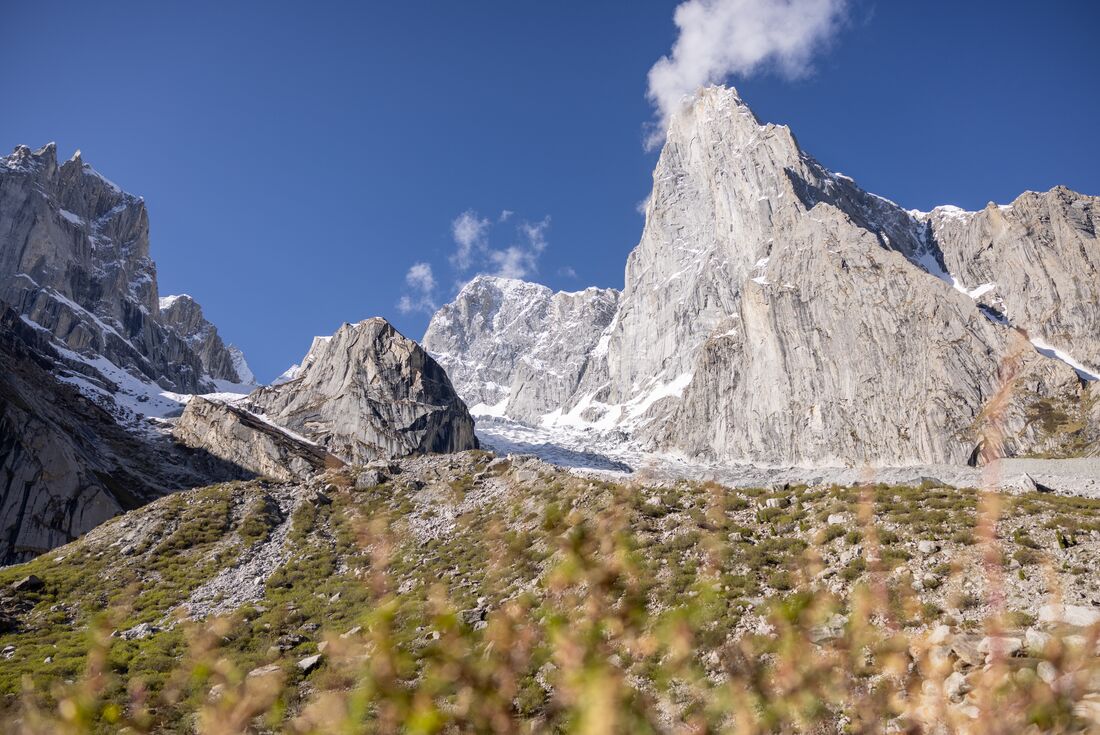
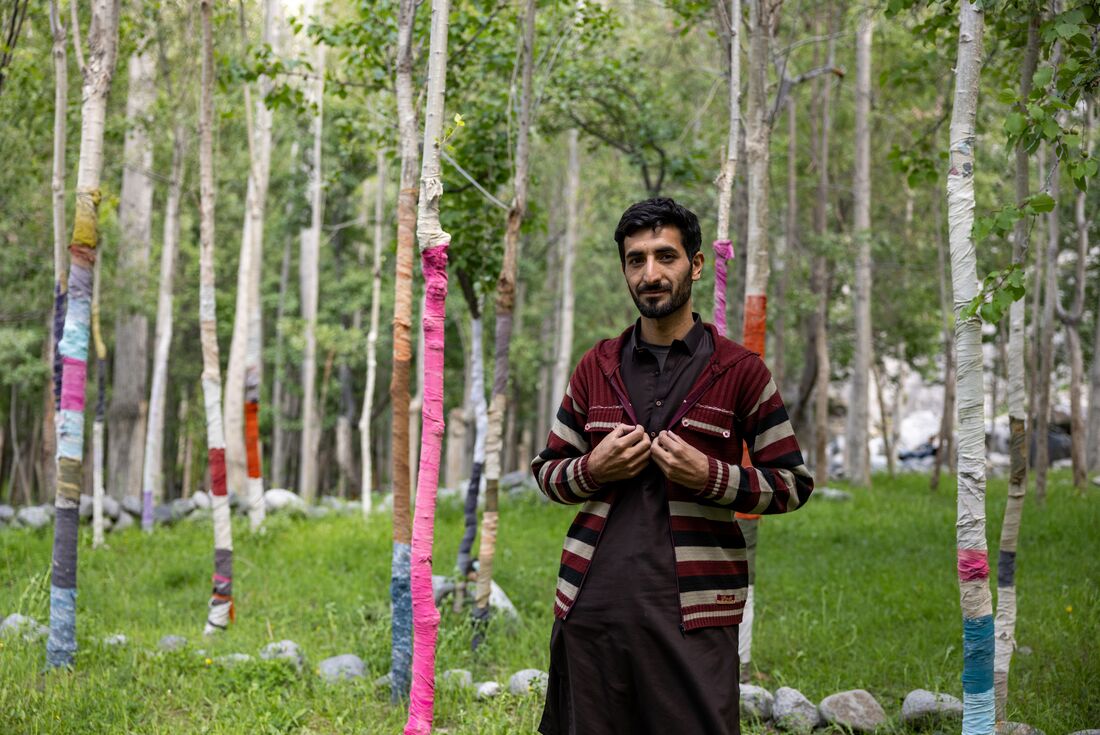
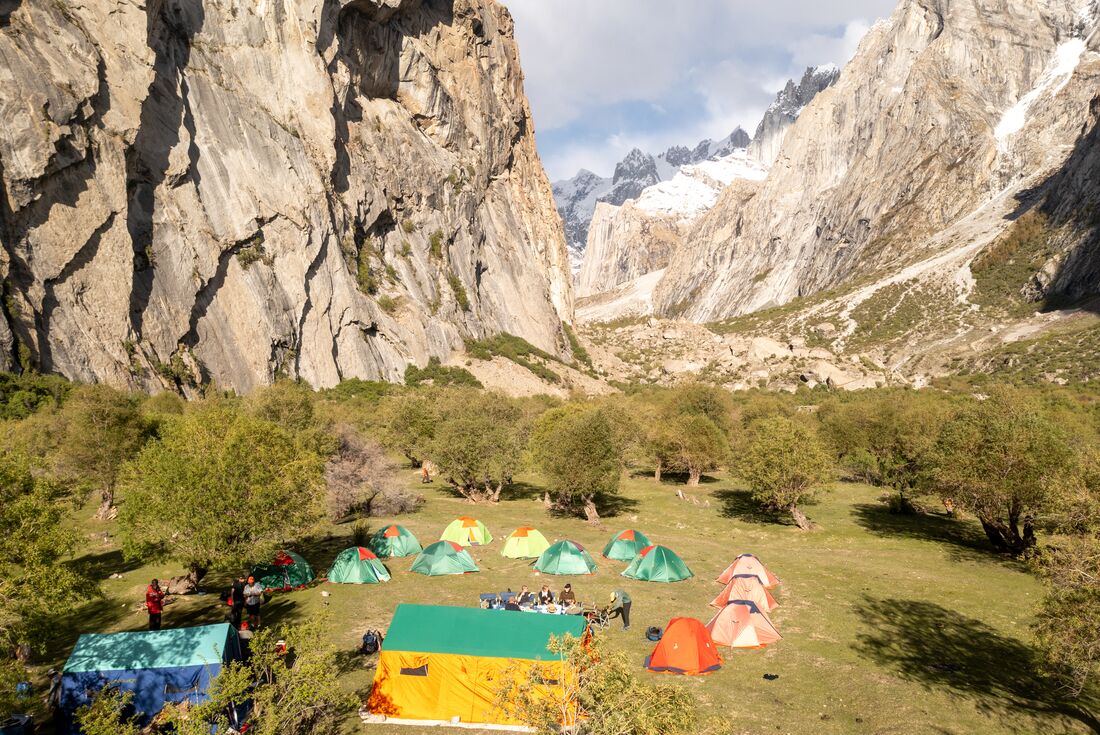
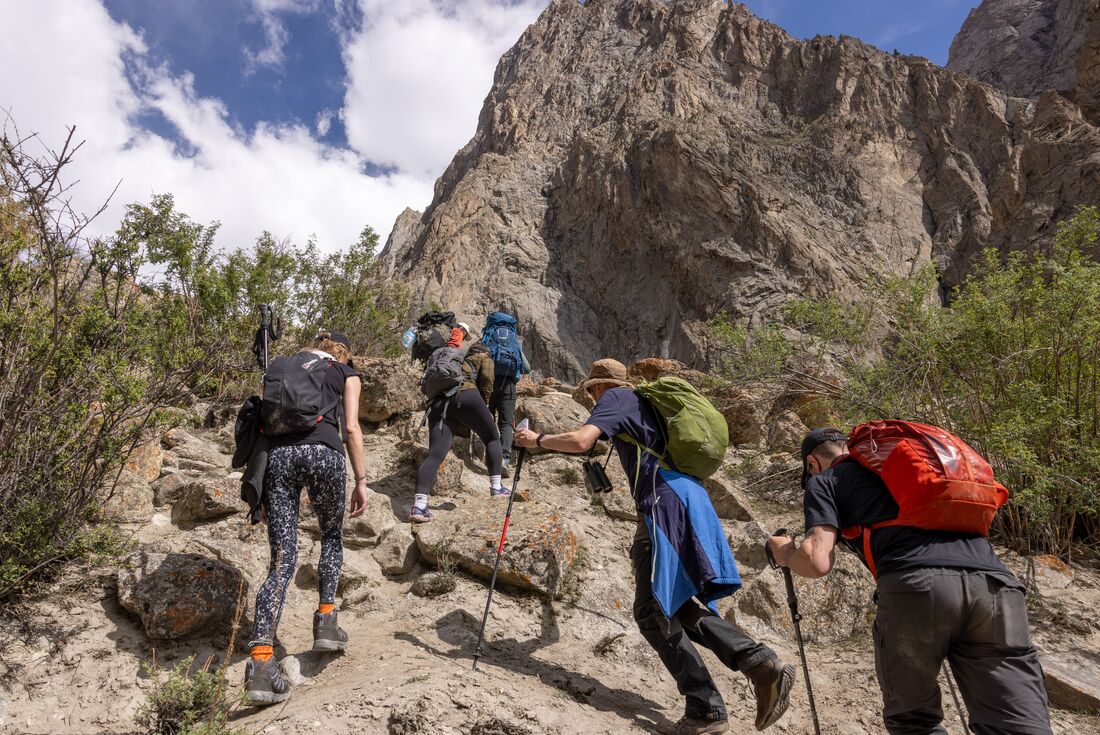
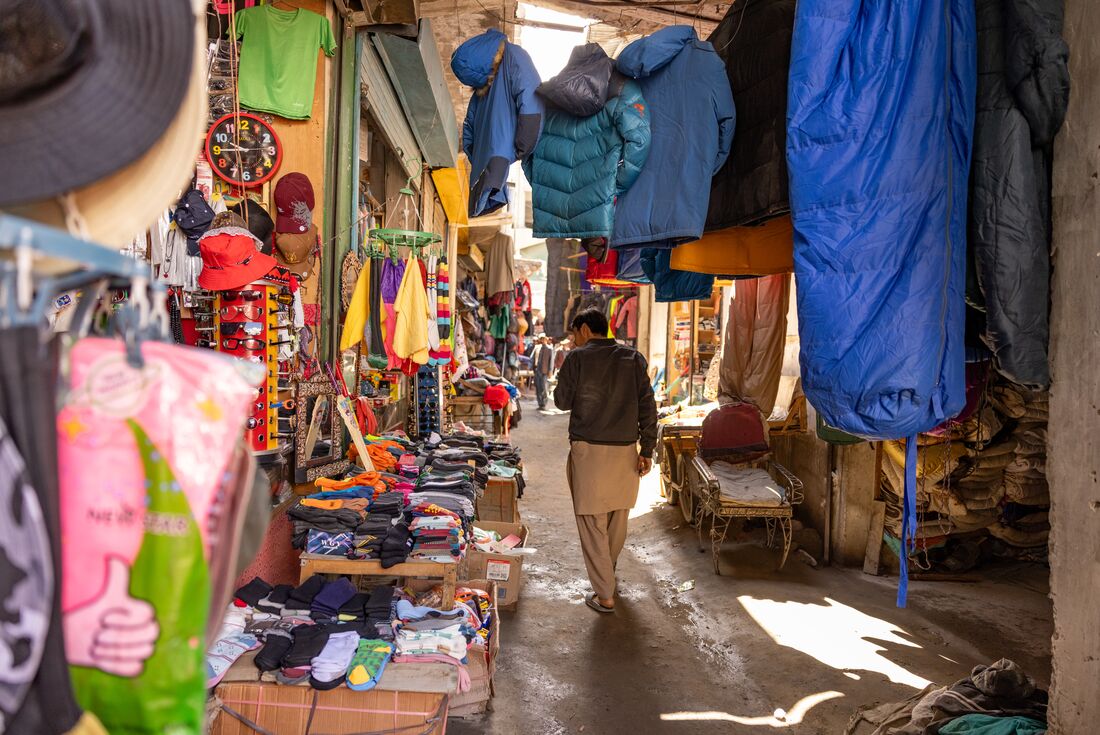
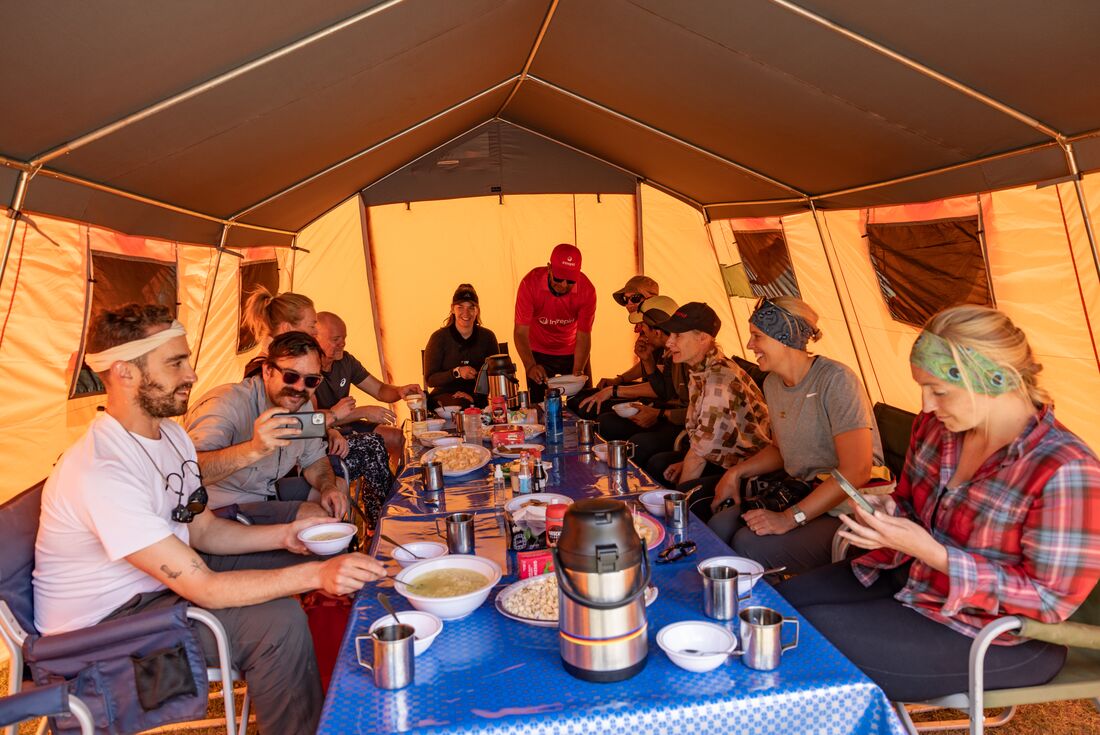
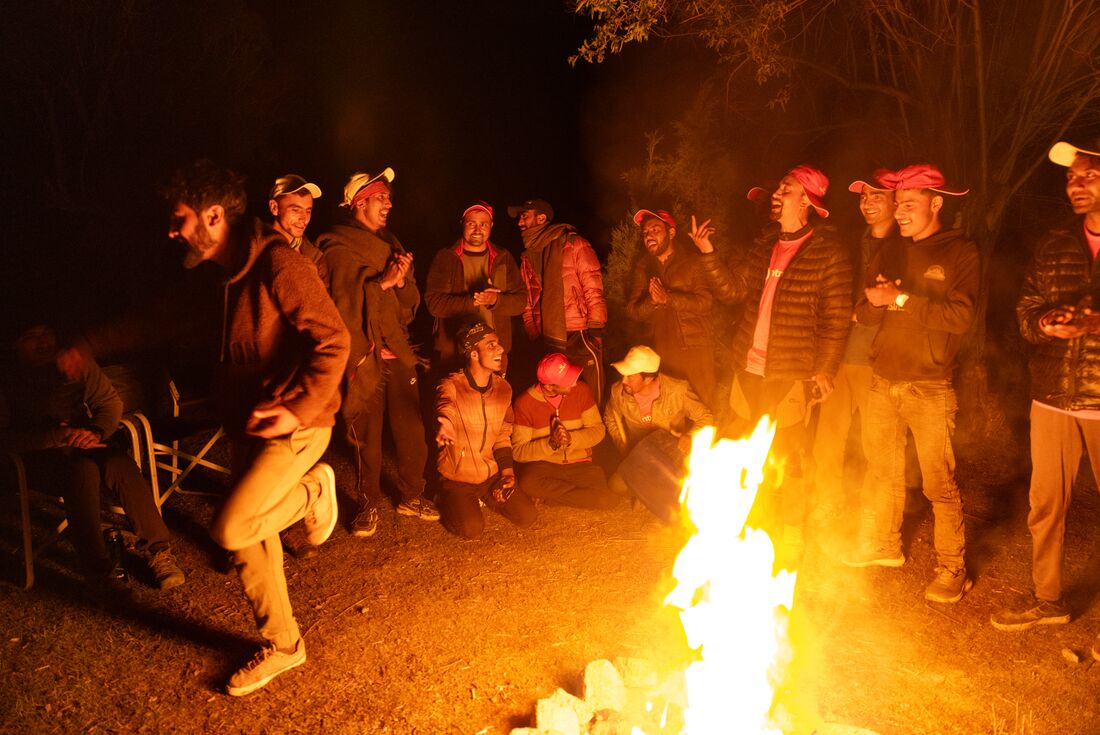
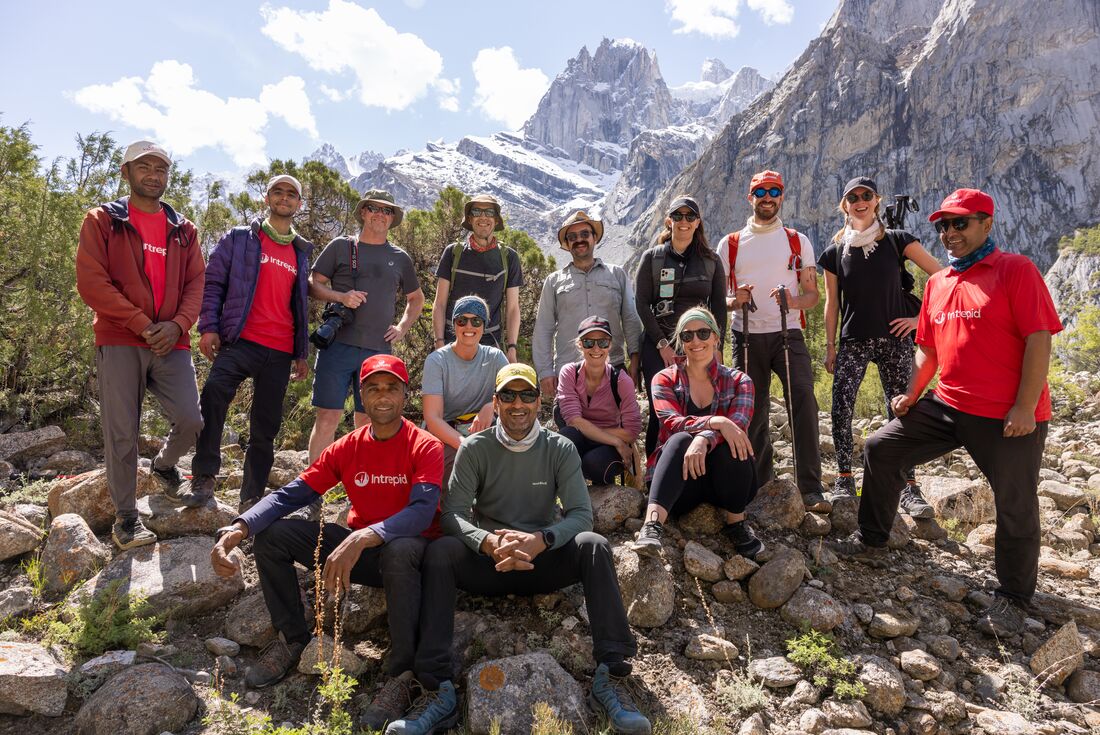
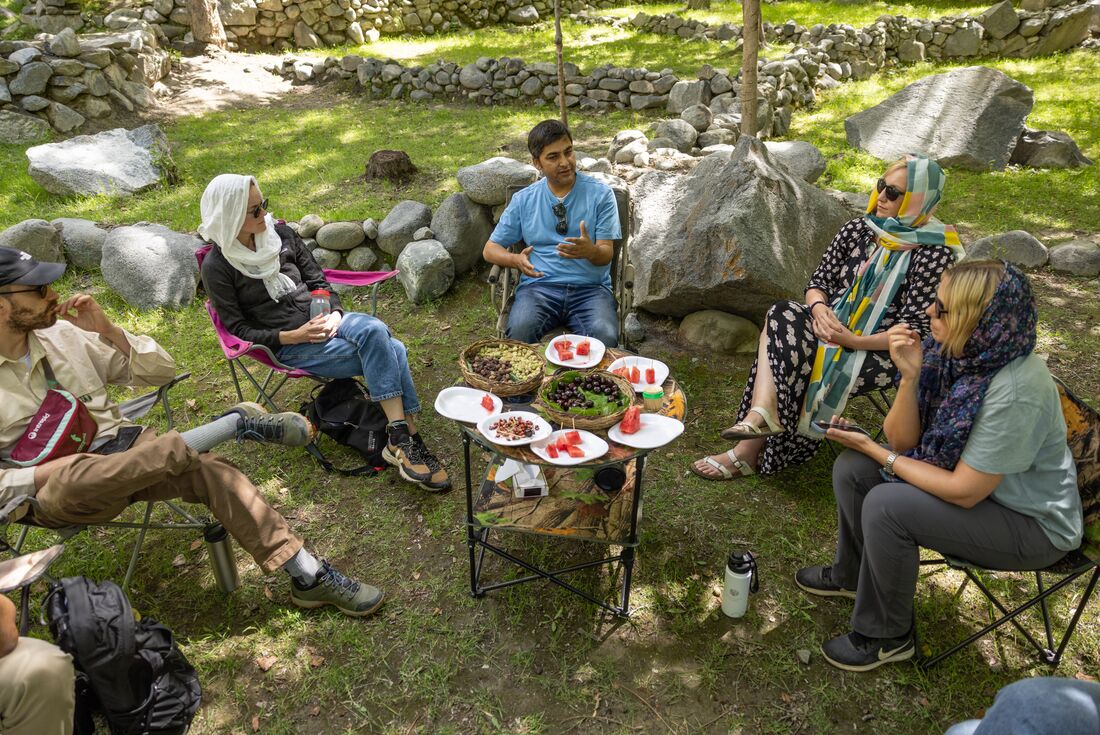
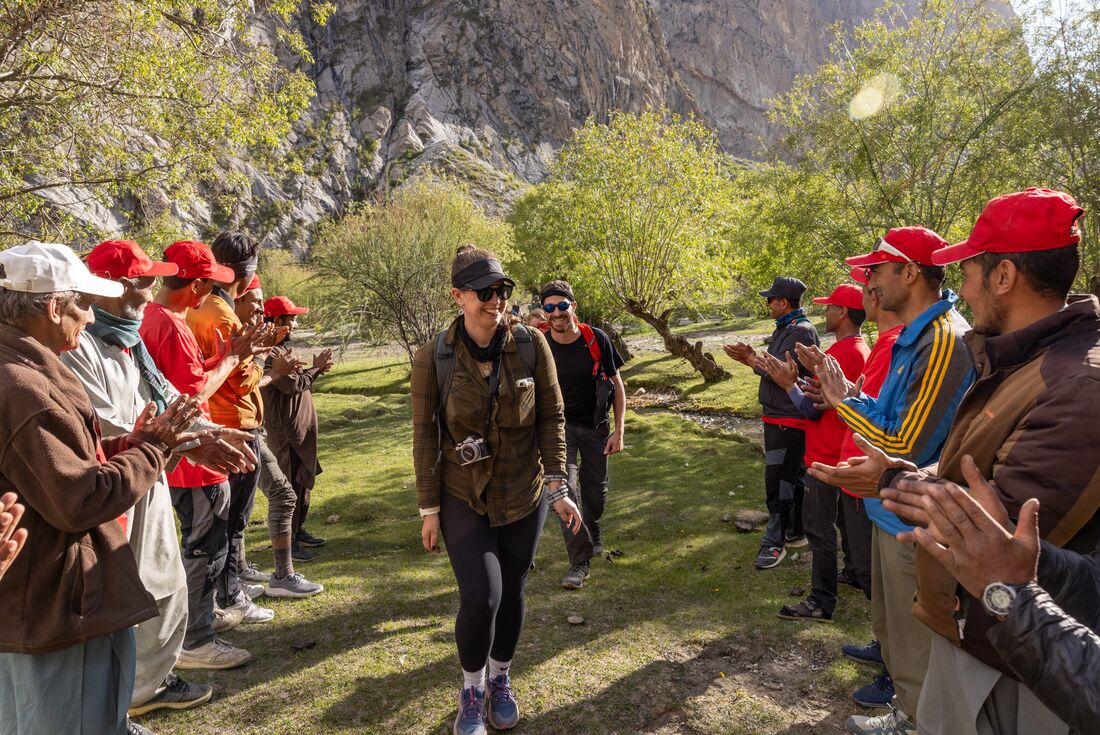


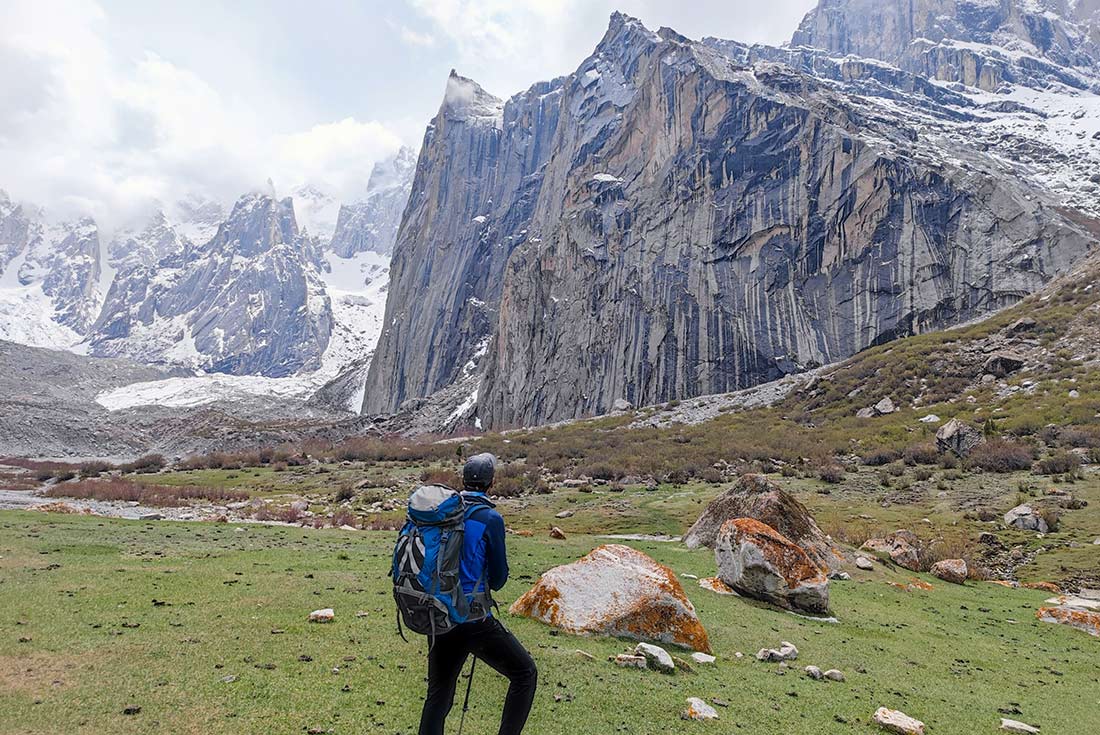
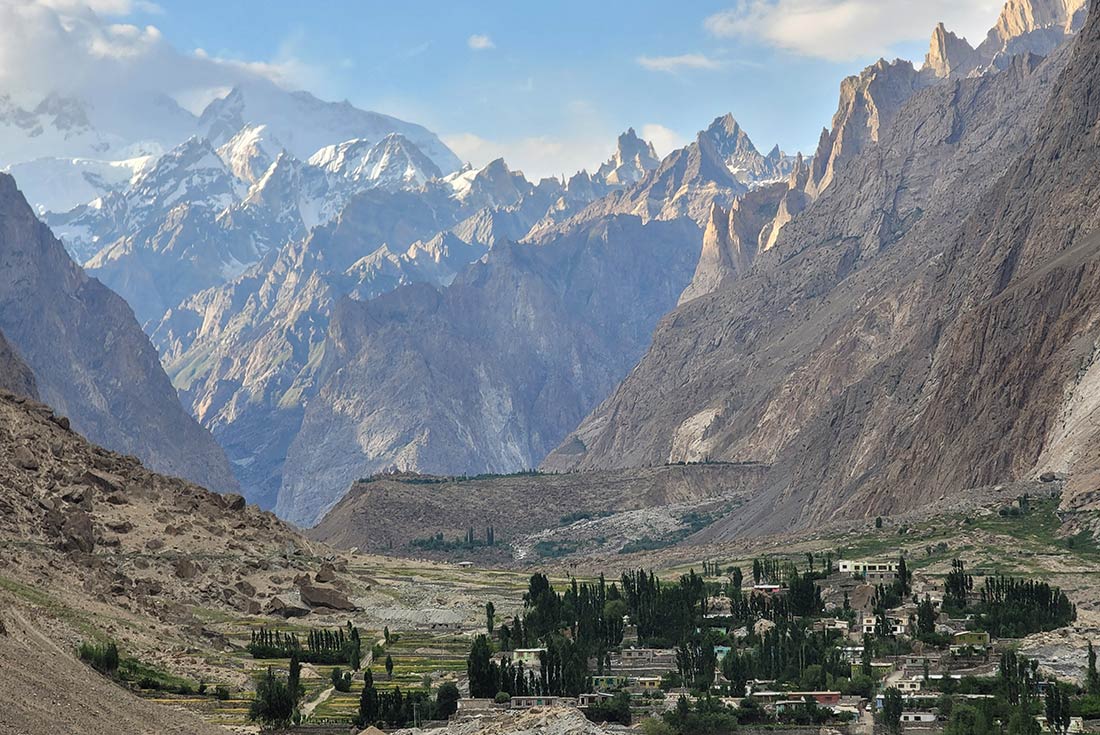
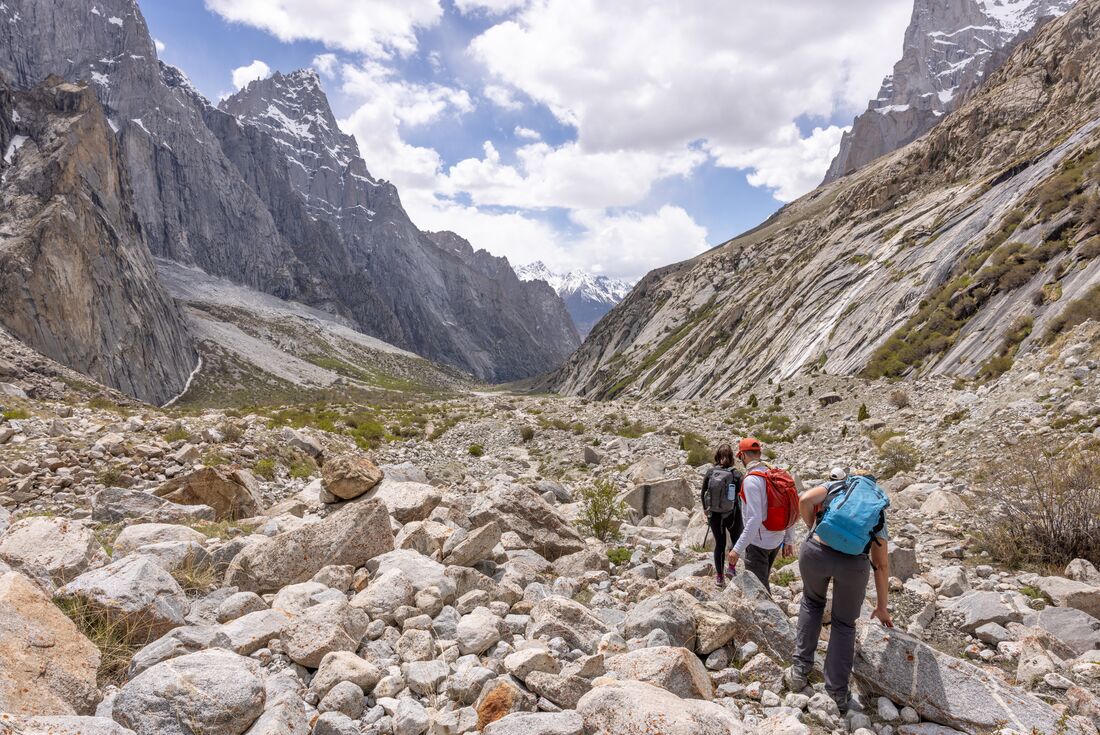
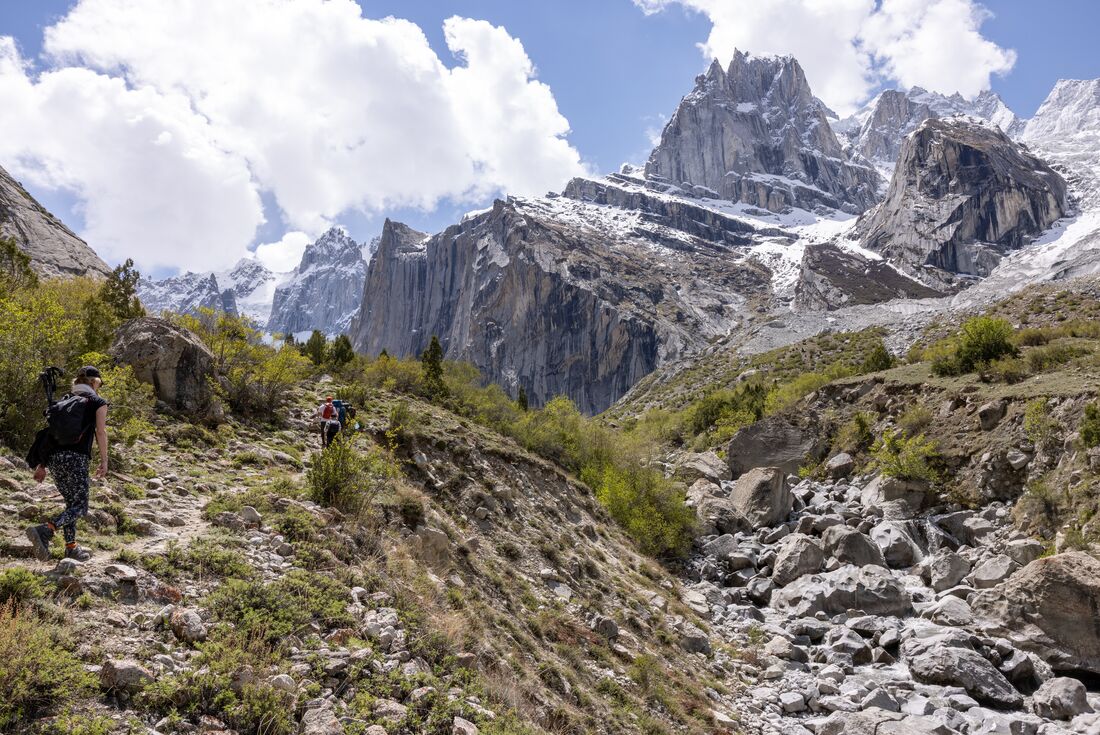
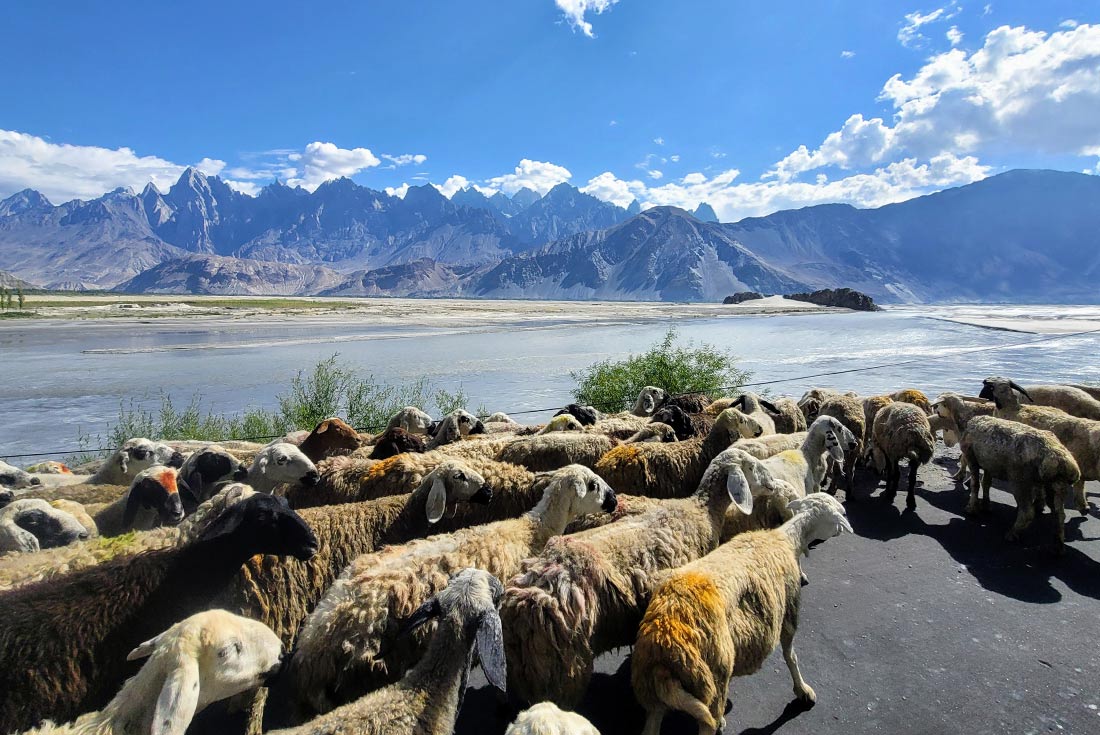

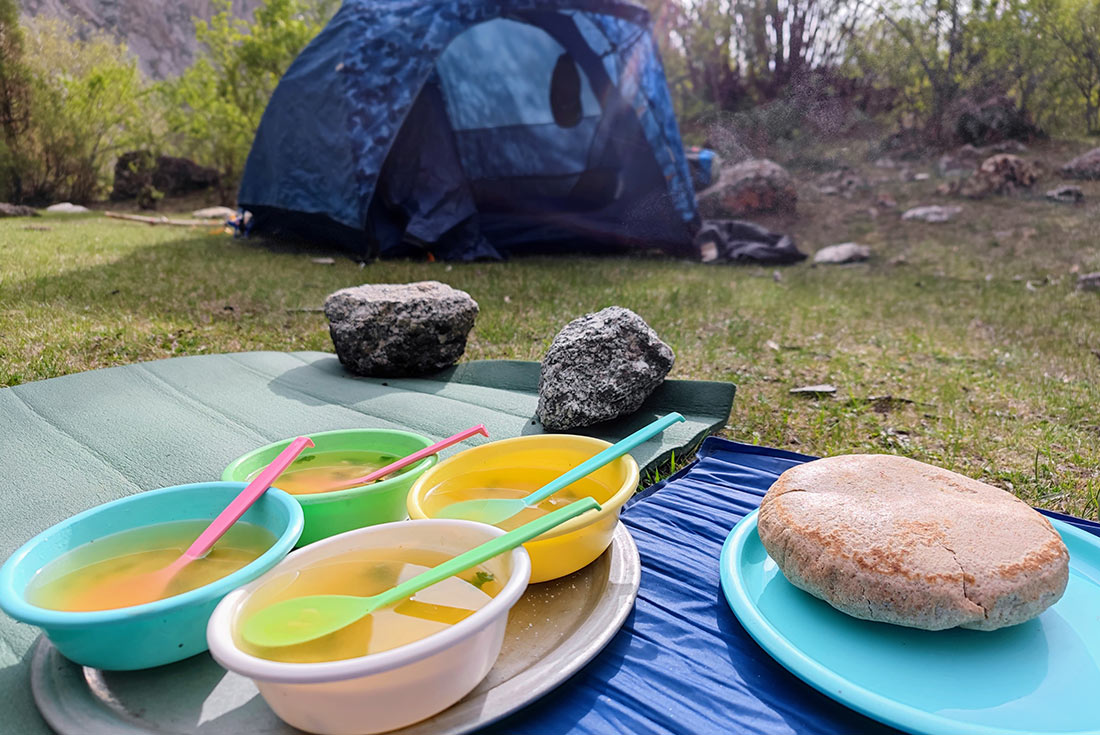
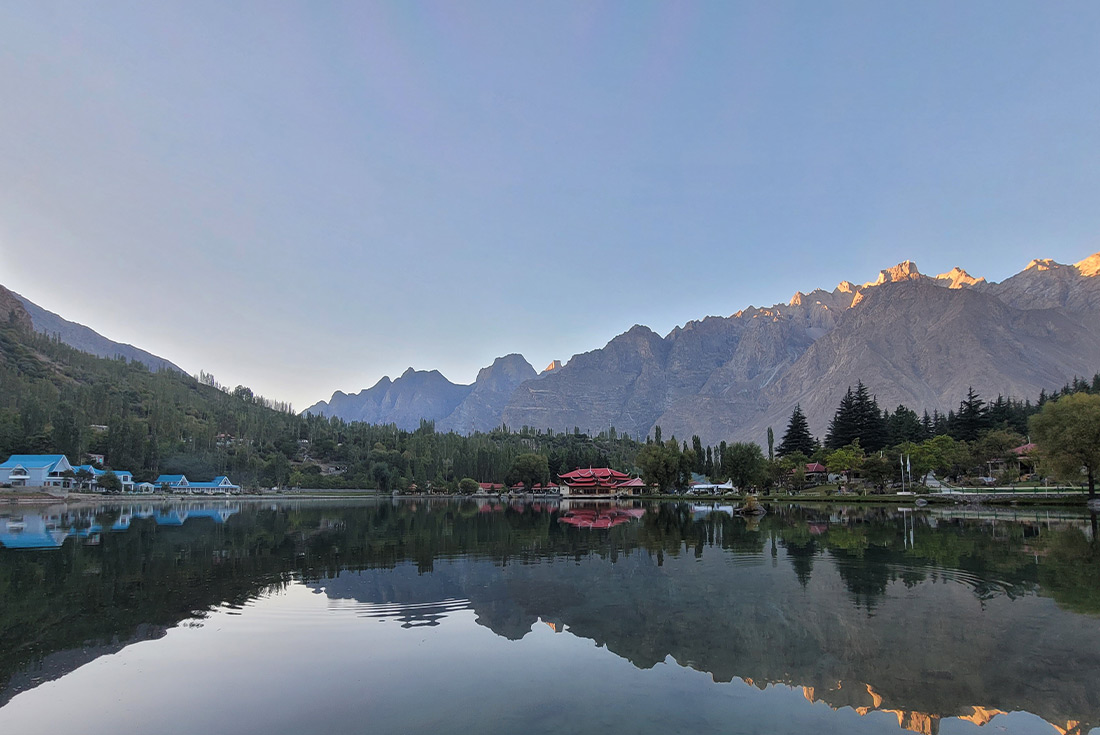
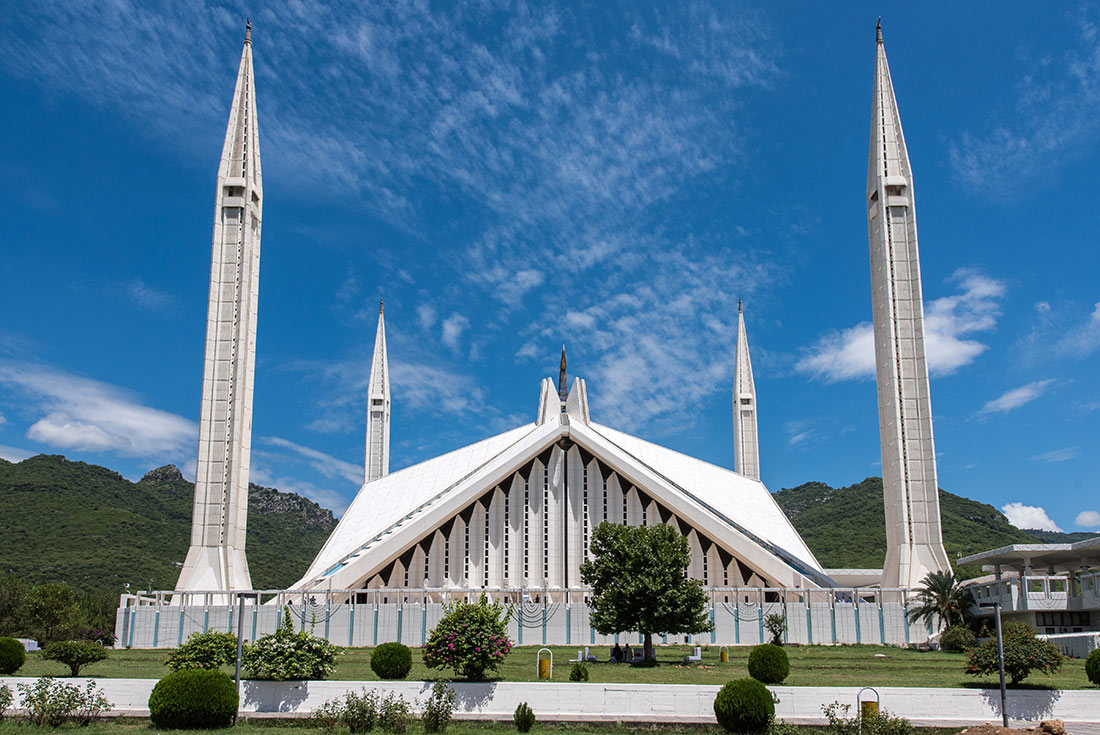
Skardu Bazaar walk
Manthal Rock Buddha
Khaplu Fort Museum
Yugo Village cultural walk
Mingulo Broq guided hike
Rumbak - Expert Licensed professional local guide
Rumbak -15 kgs of porter services per person
Live music and dance show by local Balti people
Mingulo Broq to Nangma valley guided hike
Amin Brakk base camp guided hike
Nangma valley to Kanday guided hike
Traditional lunch with local family at Kanday village
Islamabad - Taxila Museum & archeological sites
Taxila – Truck Art Workshop
Hike among the towering peaks of Northern Pakistan’s Baltistan region on well-marked trails in Nangma Valley.
Enjoy fully supported camping with expert guides, porters and a professional cooking team, providing warm Pakistani meals at every campsite.
Stay active with an optional day hike to the mountaineer’s paradise of Amin Brakk, is one of the most iconic granite peaks in Pakistan.
Join in a live Balti dance performance at the Nangma Valley campsite and cross paths with local shepherds whose pastures share these trails.
Tap into your local leader’s expert insights as you take some time to explore the capital city of Islamabad.
Ramada by Wyndham, 1 Club Road Murree Road, Islamabad, Pakistan 44000 , Islamabad, PAKISTAN
Ramada by Wyndham, 1 Club Road Murree Road, Islamabad, Pakistan 44000 , Islamabad, PAKISTAN
1. A single supplement is available if you’d prefer not to share a room on this trip. Please speak to your booking agent for further information.
2. Arrival and Departure transfers are included in this trip, please provide us with your exact flights details no later than 14 days prior to your departure.
3. On this tour we travel from Islamabad to Skardu by plane. In case of unfavourable weather, we may need to swap the flight and drive instead. Please see Special Information box on day 2 for exact contingency plan.
4. Passport scans are required at the time of booking to book domestic flights.
5. All trekking permits and National Parks entrance fees are included in the price of the trip.
6. We use Pakistan Airlines for the included internal flights.
While we always endeavour to provide the best possible holiday experience, due to the nature of travel and the areas we visit sometimes things can and do go wrong. Should any issue occur while you are on your trip, it is imperative that you discuss this with your group leader or local representative straight away so that they can do their best to rectify the problem and save any potential negative impact on the rest of your trip.
We recognise that there may be times when your group leader or local representative may not be able to resolve a situation to your satisfaction - if this is the case, please ask the group leader or local representative to speak to their direct manager.
You may also choose to provide details in your online feedback, which we ask you to complete within 30 days of the end of your trip. Please do be aware that it is very difficult for us to provide any practical help after the trip is completed, so informing us while still travelling will give us the opportunity to resolve the issue in real-time., For general contact details please use the following page: https://www.intrepidtravel.com/contact-us, Intrepid’s Local Operator: +92 305 650 2028
This trip visits places as high as 4500 m above sea level, which can cause altitude sickness, regardless of age or physical health. Please see the ‘Medical and health’ section of the Essential Trip Information for more details on travelling at altitude and ensure you are familiar with signs of Acute Mountain Sickness. , This trip involves a full camping experience, giving you access to more remote destinations at close proximity, and the joy of experiencing the elements. Expect two-person tents (single supplement available) and sleeping bags, as well as a separate mess tent to enjoy fresh meals prepared by your support crew., Please read the packing list for required equipment carefully and remember that you don’t necessarily have to bring it all with you – you can hire or buy some of it in Skardu.
Hike among the towering peaks of Northern Pakistan’s Baltistan region on well-marked trails in Nangma Valley., Enjoy fully supported camping with expert guides, porters and a professional cooking team, providing warm Pakistani meals at every campsite., Stay active with an optional day hike to the mountaineer’s paradise of Amin Brakk, is one of the most iconic granite peaks in Pakistan., Join in a live Balti dance performance at the Nangma Valley campsite and cross paths with local shepherds whose pastures share these trails., Tap into your local leader’s expert insights as you take some time to explore the capital city of Islamabad.
All group trips are accompanied by one of our group leader or local representative. The aim of the group leader or local representative is to take the hassle out of your travels and to help you have the best trip possible. Intrepid endeavours to provide the services of an experienced group leader or local representative however, due to the seasonality of travel, rare situations may arise where your group leader or local representative is new to a particular region or training other group leader or local representative.
Your group leader or local representative will provide information on the places you are travelling through, offer suggestions for things to do and see, recommend great local eating venues and introduce you to our local friends. While not being guides in the traditional sense, you can expect them to have a broad general knowledge of the places visited on the trip, including historical, cultural, religious, and social aspects. At Intrepid we aim to support local guides who have specialised knowledge of the regions we visit. If you are interested in delving deeper into the local culture at a specific site or location then your group leader or local representative can recommend a local guide service in most of the main destinations of your trip.
TRAVEL ADVISORIES & ALERTS
We recommend that you check your government's foreign travel advisory for the latest information about the destination before you travel. You will also need to ensure that your travel insurance covers you for all destinations and activities on your trip. We also recommend saving the phone number for emergency consular assistance for your government’s consulate in the destination/s you’ll be travelling. Links to travel advisories and any current travel alerts for our trips can be found here: https://www.intrepidtravel.com/travel-alerts
PERSONAL SAFETY
Ensure you have a secure method of carrying your passport, phone, credit cards and cash while travelling such as a money belt. Leave all other high value items, including jewellery, at home Use safety deposit boxes at hotels to store your valuables when available and ensure your luggage is lockable. Be aware of the risk of pick-pocketing and petty theft. Exercise caution when walking at night, don’t walk alone and stick to well-lit streets wherever possible. Be vigilant on public transport and look out for your fellow travellers. Take precautions such as carrying your bag in front of you and never leaving personal items unattended.
LGBTQIA+ TRAVELLERS
Intrepid welcomes all LGBTQIA+ customers on our trips, however we operate in parts of the world that are less accepting. We support LGBTQIA+ customers to travel to these destinations and are committed to ensuring they face no discrimination on any part of the trip we control. We recommend you visit Equaldex (https://www.equaldex.com/) and your government's foreign travel advice for LGBTQIA+ travellers when choosing your trip., https://www.intrepidtravel.com/safety-guidelines, WOMEN'S SAFETY:
Women should exercise caution when travelling in Pakistan. While the risk of an incident occurring on your trip is very low, below are some things you can do for your safety and peace of mind when travelling:
- Respect local dress codes and customs and dress more conservatively than you do at home. Please see section on conservative dress.
- Avoid isolated areas, including beaches, unlit city streets and village lanes when alone at any time of day.
- Avoid travelling alone on public transport, or in taxis or auto-rickshaws, especially at night.
- If you have to use a taxi get them from hotel taxi ranks and use pre-paid taxis at airports. Try to avoid hailing taxis on the street.
- If you’re being collected at the airport by a driver make sure they have properly identified themselves before you set off.
For further information and advice, visit:
https://www.intrepidtravel.com/au/pakistan/is-it-safe-to-travel-pakistan
https://www.gov.uk/government/publications/2010-to-2015-government-policy-british-nationals-overseas/2010-to-2015-government-policy-british-nationals-overseas#appendix-2-advice-for-women-travellers
https://www.smartraveller.gov.au/before-you-go/who-you-are/women
PERSONAL BELONGINGS:
We strongly recommend the use of a neck wallet or money belt while travelling, for the safe-keeping of your passport, air tickets, cash and other valuable items. Leave your valuable jewellery at home - you won't need it while travelling. Many of our hotels have safety deposit boxes, which is the most secure way of storing your valuables. A lock is recommended for securing your luggage.
FREE TIME:
Your leader will accompany you on all included activities, however during your trip you'll have some free time to pursue your own interests, relax and take it easy or explore at your leisure. Please use your own good judgement when selecting an activity in your free time. Please also note that your group leader has the authority to amend or cancel any part of the trip itinerary if it's deemed necessary due to safety concerns.
PERSONAL SAFETY:
While travelling there is always the risk of pick-pocketing and petty theft, particularly in the more touristy cities. We recommend that you exercise caution when walking alone at night and encourage you to walk together and only on main, well-lit thoroughfares. Be particularly vigilant on public transport. Simple measures like carrying your day pack on your front, not hanging your bag over the back of your chair and wearing a money belt will reduce any chance that your valuables should go missing.
SCAMS:
Scams involving ATM and credit cards, train tickets, taxis, temple donations and tourist guides operate throughout Pakistan. If you are the victim of a scam, report it immediately to the nearest police station. Even though they may not be able to get your money or goods back, they can issue you with an official loss report for insurance purposes.
PASSPORT
You’ll need a valid passport to travel internationally and most countries require your passport to have a minimum of 6 months validity, so remember to check the expiry date.
We need your passport information to get everything ready for your trip so it’s important that the information on your booking matches your passport exactly. Please take care to provide the correct details. We recommend carrying a copy of the photo page of your passport while travelling and leaving a copy at home with family or friends.
VISAS & ENTRY REQUIREMENTS
Many countries require a visa and obtaining the correct visa for your trip and any countries you may transit through is your responsibility. We recommend you check your visa requirements as soon as you have booked your trip. This will ensure you have time to prepare your documents and for your visa application to be processed. You can check the entry requirements for your nationality on your government's foreign travel advisories, consular websites or on our page here: www.intrepidtravel.com/visa-entry-requirements, Important Update on Tourist Visa Application Process for Pakistan
Due to recent changes in the tourist visa application process for Pakistan, we strongly advise utilizing the official e-visa platform: PAK VISA.
When you begin a new visa application, you will be required to provide the following information:
Application Information
Personal Information
Family Information
Financial and Employment Details
Previous Travel History
Visit Information:
Supporting Documents/Photograph
Key Details for Your E-Visa Application:
Visa Category: Visa Prior to Arrival
Visa Sub-category: Tourist
Entry Port: Islamabad Airport
Departure Port: Islamabad Airport
Arrival Date: Please select your intended date of arrival in Pakistan
Departure Date: Please select your intended date of departure from Pakistan
In the next stage, you will need to provide additional information, including Personal Information, Passport Details, Financial and Employment Information, and your planned Visit Details. For the Visit Details section, please use the following information:
Type of Stay: Hotel
Check-in Date: Arrival Date
Check-out Date: Departure Date
Hotel Address: Ramada by Wyndham, Islamabad
Province: Islamabad
Contact Number: +92 111 379 379
District: Islamabad
Hotel Name: Ramada by Wyndham
Please ensure all information is accurately entered to avoid delays in the visa approval process.
Information not available.
Validity: 01 Jan 2026 to 31 Dec 2026
GENERAL HEALTH
All travellers need to be in good physical health in order to participate fully on this trip. For the safety and wellbeing of yourself and others, if you are unwell prior to travelling, please stay at home and contact us to make alternative arrangements.
When selecting your trip please make sure you have read through the itinerary carefully and assess your ability to manage and enjoy our style of travel. Please note that if in the assessment of our group leader or local representative a traveller is unable to complete the itinerary without undue risk to themselves and/or the rest of the group, we reserve the right to exclude them from all or part of a trip without refund.
You should consult your doctor for up-to-date medical travel information or for any necessary vaccinations before departure. We recommend that you carry a first aid kit as well as any personal medical requirements in their original packaging as they may not easily be obtained while travelling. If you are carrying medication, ensure you check your government's foreign travel advice for any local restrictions or requirements.
, AIR POLLUTION:
During winter months (October-February), air pollution levels in parts of Pakistan can spike to problematic levels. Severe pollution can increase the risk of respiratory problems. Those with pre-existing medical conditions, particularly heart and lung conditions, may be especially affected. Your leader can assist you to obtain a face mask if required.
ALTITUDE SICKNESS:
Travellers to altitudes higher than 2,500m are at risk of altitude sickness, also known as acute mountain sickness (AMS). This can be life threatening and affect anyone, even people who are very physically fit. There is a higher risk for those who have had altitude sickness before, who exercise or drink alcohol before adjusting to the altitude, or who have health problems that affect breathing. If your tour travels to high altitude, see your doctor for advice specific to you and your situation before you depart. It is important to be aware of the normal altitude symptoms that you may encounter BUT NOT worry about:
- Periods of sleeplessness
- Occasional loss of appetite
- Vivid, wild dreams at around 2500-3800m in altitude
- Unexpected momentary shortness of breath, day and night
- Periodic breathing that wakes you occasionally
- Blocked nose
- Dry cough
- Mild headache
If you are feeling nauseous, dizzy or experience other symptoms, please be sure to let your group leader know immediately so that we can monitor your condition.
Please be aware that should your group leader deem it unsafe for you to continue trekking at any time, they will arrange for you to descend to a lower attitude.
Please read the following document carefully and, during your trip, utilise the table on the back daily to record your own perspective of your general health and any symptoms you may experience: https://www.intrepidtravel.com/altitude-sickness
MOSQUITO-BORNE ILLNESSES:
Malaria is a risk in parts of Pakistan, including major cities. Cases of dengue fever are reported, especially in the period after the monsoon. Other mosquito-borne diseases (including Japanese encephalitis, chikungunya fever, and filariasis) also occur. Take preventative measures such as as wearing long clothing, using repellent and being indoors particularly around dusk and dawn. Consult a medical professional regarding prophylaxis against malaria. For more information, see the World Health Organisation's fact sheets: https://www.who.int/neglected_diseases/vector_ecology/mosquito-borne-diseases/en/
OTHER INFECTIOUS DISEASES:
Water-borne, food-borne, parasitic and other infectious diseases (including meningitis, cholera, polio, typhoid, hepatitis, tuberculosis, diphtheria and rabies) are common in Pakistan. Tap water is not safe to drink. Seek medical attention if you suspect food poisoning, if you have a fever or suffer from diarrhoea.
POLIO VACINATION:
If you are planning to stay in Pakistan for 4 weeks or more, proof of polio vaccination, given 4 weeks to 12 months before departure from Pakistan, may be required on exit. If you are unable to provide this, you may need to be vaccinated before leaving Pakistan.
, ALTITUDE SICKNESS
This trip travels to altitudes where there is a risk of Acute Mountain Sickness (AMS), a potentially life-threatening condition if left untreated. AMS can affect anyone, regardless of age, fitness or experience. There is a higher risk of AMS for those who have had it before, those who drink alcohol and those who take part in strenuous exercise before correctly acclimatising.
As some medical conditions or medications may increase your susceptibility, we strongly advise discussing any pre-existing conditions, your participation in this trip, and preventative medications such as Diamox with your doctor.
Our itineraries are carefully designed and risk-assessed in line with our Altitude Safety Policy and current best practice standards for safe acclimatisation. However, AMS can still occur, and it’s essential to be aware of the signs and symptoms. These include nausea, dizziness, shortness of breath and headaches.
Our experienced leaders are trained in AMS awareness and first aid and will conduct regular checks to help you monitor your health throughout the trip. They have full authority to make decisions regarding your participation based on medical needs or AMS symptoms, including delaying or stopping your ascent if necessary.
More information about Altitude Sickness can be found here: https://www.intrepidtravel.com/au/altitude-sickness
While travelling with us you'll experience the vast array of wonderful food available in the world. Your group leader or local representative will be able to suggest restaurants to try during your trip. To give you the maximum flexibility in deciding where, what and with whom to eat, generally not all meals are included in the trip price. This also gives you more budgeting flexibility. As a rule, our groups tend to eat together to enable you to taste a larger variety of dishes and enjoy each other's company. If you have dietary requirements and/or food allergies, please let your booking agent know prior to departure., Though the food in Pakistan is no doubt delicious, it’s not necessarily the ‘clean-eating’ diet of your dreams. There’s a lot of oil, meat and bread, and a fresh Waldorf salad can be rather difficult to come by. Like India, Pakistan’s hygiene standards can sometimes be lacking and it’s not uncommon for travellers to experience stomach troubles at some point in their journey. This is just a part of travelling in the developing world. Your tour leader will be able to direct you towards restaurants that are known to have better hygiene, especially in tourist areas where they are travelling with our groups regularly.
If you are a strict vegetarian you may find travelling in Pakistan difficult at times. Meat is a daily staple, and things may be awkward if your host cooks up a feast and is unaware of your diet. Travelling as a vegan is particularly difficult as many dishes will include butter, ghee butter or yoghurt. Furthermore, vegetarian dishes are sometimes cooked with meat stock or in the same pot as meat. It’s possible, yes, but it’s important to be clear while understanding that veganism just isn’t a concept in Pakistan., During trekking, provided food will be a mixture of local and international dishes made from ingredients mostly purchased in Pakistan and cooked at the camp every day. Breakfasts consist of cereal, muesli or porridge, eggs, bread or chapatti, tea and coffee. Picnic lunches will include a choice of meats, cheese, pickles, crackers or chapattis, sometimes accompanied by hot soup and noodles. Dinner is usually a three-course meal served in a group 'mess' tent. We cater for vegetarians, but you must inform us if you wish your diet to be exclusively vegetarian. The trek kitchen provides drinking water during breakfasts and lunch stops. While trekking, trail mix and snacks will also be provided.
SPENDING MONEY
When it comes to spending money on the trip, every traveller is a little different. You know your spending habits better than we do, so please budget an appropriate amount for things like optional meals, drinks, shopping, optional activities, and laundry. Make sure you have read the itinerary and inclusions thoroughly so you know what is included in the trip price and what you may need to pay for while travelling. , PAKISTAN
The official currency of Pakistan is the Pakistan Rupee (PKR). This is the only currency accepted in Pakistan. You cannot pay in USD, EUR or other currencies.
ATMs are available in most major towns and cities. Withdrawal limits vary, sometimes as low as USD 100 per day, and may differ from your withdrawal limit at home. Some banks don't accept foreign cards (eg Islamic banks won’t take foreign cards) and ATMs in the mountains have been known to run out of cash. Check with your bank before leaving home about using your cards in Pakistan.
Credit cards are generally accepted in tourist shops and some restaurants. Visa and Mastercard are preferred. Smaller shops and restaurants only accept cash. Foreign currency is easily changed at exchange bureaus, who generally offer the best rates.
, TIPPING
Tipping can be an appropriate way to recognise great service when travelling. While it may not be customary in your home country, it is an entrenched feature of the tourism industry across many of our destinations and is greatly appreciated by the people who take care of you during your travels. It is always best to avoid tipping with coins, very small denomination notes, or dirty and ripped notes, as this can be regarded as an insult rather than the goodwill gesture it is intended to be., OPTIONAL TIPPING KITTY
On Day 1 of your trip, your group leader or local representative may discuss with you the idea of operating a group tipping kitty, whereby everybody contributes an equal amount and your group leader or local representative distributes tips for drivers, local guides, hotel staff and other services included on your trip. Participation in this kitty is your choice, and you are welcome to manage your own tipping separately if you prefer.
The group leader or local representative will keep a running record of all monies spent, which can be checked at any time. Any funds remaining at the end of the trip will be returned to group members. These tips to suppliers are for great service and are in addition to the regular costs paid for the services supplied.
The tipping kitty excludes tips for your group leader or local representative, and providers of optional activities., Optional tipping kitty for this trip: USD 60 per person (can be paid in local currency)., YOUR GROUP LEADER OR LOCAL REPRESENTATIVE
Tipping your group leader or local representative is highly appreciated if you feel they’ve provided outstanding services throughout your trip. The amount is entirely a personal preference; however, as a guideline, the recommended amount is 4-7 USD or EUR per traveller per day (in a currency relevant to your destination). Of course, you are free to tip more or less as you see fit, depending on your perception of service quality and the length and involvement of your group leader or local representative on your trip., CONTINGENCY FUNDS
We try to plan for every eventuality, but there are still some things beyond our control. We reserve the right to change an itinerary after departure due to local circumstances or a Force Majeure Event. In such emergency circumstances, the additional cost of any necessary itinerary alterations will be covered by you. Please note we are not responsible for any incidental expenses that may be incurred as a result of the change of itineraries including but not limited to visas, vaccinations or non-refundable flights. Make sure you have access to an extra US$500 for emergencies (e.g. severe weather, natural disasters, civil unrest) or other events that result in unavoidable changes to the itinerary (e.g. transport strikes or cancellations, airport closures). Sometimes these things necessitate last-minute changes to enable our trips to continue to run, and as a result, there may be some extra costs involved. The recommended amount is listed in USD for the relatability of universal travellers, however, local currency may be needed once in the country to cover these costs.
Most travellers prefer to take a small to medium wheeled suitcase, which is a great size for the packing capacity in our private vehicles. Whatever you take, be mindful that you will need to be able to carry your own luggage, handle it at airports, take it in/out of accommodation and perhaps even walk short distances. We recommend you pack as lightly as possible.
If your trip includes travelling on overnight trains or primarily using public transport, the smaller your luggage, the easier it will be to store under or above bunks. Large suitcases may not be able to be taken on board. A lockable bag or small padlock for your bag will be useful, especially when travelling on public transportation as well.
When you're exploring during the day, you'll also need a day pack/bag to carry water, a camera, a jacket and activity-specific items like a swimsuit, a waterproof pouch/bag for your phone, or hiking shoes.
Below we have listed the essentials for this trip:, https://www.intrepidtravel.com/packing-list, LUGGAGE LIMITS:
Domestic flights in Pakistan have strict weight limits - 20kg of check-in luggage and 5kg of carry-on hand luggage per person is included with your flight ticket. , As well as your underwear, toothbrush and other items you always need to pack for travel, below are some items that you specifically need for this trip.
https://www.intrepidtravel.com/packing-list
MAIN LUGGAGE
You need to bring your main piece of luggage as well as a small to medium backpack for day’s walks (20-25 litres). One with waist strap would be most comfortable for all included hikes.
Please note, your main luggage is going to be transported from one camp to the other while you walk. Total weight of your main bag must not exceed 15kg and it should be packed in a soft bag/duffle bag or a rucksack. Any excess luggage can be stored in Islamabad for the duration of the trek, at extra cost.
ESSENTIALS
- Day pack: for carrying essentials during activities
- Trekking clothing: A mixture covering lightweight clothing and some warm layers is recommended. Your activities will take place in high mountans, where weather may change quickly. Lightweight, comfortable, and quick drying clothes for the activities are best. Laundry facilities may not be available on every day basis, so make sure you have a few cycles of clothes.
- Sturdy hiking boots with a good grip, ankle support and waterproof membrane that are comfortable to walk for an entire day
- 3 season sleeping bag (comfort rated min -5°C). Can be hired in Skardu at approximate cost of $2 USD per day
- Walking Poles for support on steep uphill sections and longer descents. Can be hired in Skardu at approximate cost of $1.5 USD per day
- Comfortable shoes for shorter beach walks or evenings spend around accommodation
- Sport sandals
- Light jacket, fleece and base layers
- Warm down jacket
- Warm hut and gloves
- Wind and waterproof jacket
- Waterproof over trousers
- Breathable, non-cotton hiking t-shirts
- Long hiking pants or zip-offs
- Nylon hiking shorts
- Scarf or buff
- Water bottle or bladder: you will need water during activities and it’s best to avoid buying unnecessary plastic.
- Sun protection: sunscreen, sunglasses, sunhat or bandana
- Torch/flashlight/headtorch
- Toiletries
RECOMMENDED
- Personal medical kit. A larger kit will be on hand with your leader, but we recommend you carry items such as mild pain killers, antihistamine tablets and any personal medication you may need
- Ear plugs & eye mask
- Camera with spare batteries/power bank: You will have access to power to recharge your electrical items daily
- Travel eco-friendly wipes/hand sanitizer
OPTIONAL
- Swimwear
- A good book, a journal and music player
VALUABLES
Please try to avoid bringing unnecessary valuables. It’s also recommended to bring a copy of all important documents e.g. air tickets, passport, vaccination certificate, etc. and keep the copies separate from the originals. While not valid, a photocopy makes it very much easier to obtain replacements if necessary.
If you need some further tips for packing, you can always check out our ultimate packing list.
WATER BOTTLE
Please bring your own water bottle to refill along the way. The sale of bottled water contributes to an enormous environmental problem around the world. In addition to the water in bottles, the production of a 1 litre plastic bottle takes 2 litres of water and 200ml of oil. A large proportion end up in limited landfill or discarded in waterways and natural environments.
In the mountainous areas of the north, the climate is continental up to high altitudes, with a wide temperature range between winter and summer, and often also between night and day. The temperature naturally decreases with altitude. The northern area, as well as being the coldest at equal altitude, is more prone to cold fronts brought by the westerly winds.
In Skardu, located at 2,200 meters (7,200 ft) above sea level, the climate is arid continental, with an average ranging from -2.5 °C (27.5 °F) in January to 24 °C (75 °F) in July.
Intrepid won't tolerate any kind of violence, harassment (whether physical, verbal or sexual), or disrespect toward fellow travellers, our teams or local communities.
To ensure the wellbeing of everyone on the trip, decisions made by your group leader are final.
Romantic relationships between travellers and group leader or local representative are not permitted while on trip.
Any behaviour that prevents your leader from continuing the itinerary as planned, breaks local laws or opposes any of these guidelines may result in Intrepid denying your booking or removing you from the trip.
If something concerns you during your travels, please speak to your group leader immediately. Alternatively, you can contact us on the emergency contact number detailed in the Problems and Emergency Contact Information section of this Essential Trip Information. , ALCOHOL, DRUGS AND CONTRABAND:
Alcohol is restricted in Pakistan. Non-Muslim foreigners are allowed to order alcohol in restaurants and hotels that have liquor licenses, and foreigners can also apply for alcohol permits, however these can be tedious to obtain. The death penalty can and has been imposed for crimes including blasphemy, murder, drug offences, rape and unlawful assembly.
If found, pork products, obscene material (even glossy magazines showing people in immodest poses), and controversial literature will all be confiscated by custom officials. Upon arrival, you as a foreigner will likely be whisked through customs but note that random bag checks do commonly occur.
The style of accommodation indicated in the day-to-day itinerary is a guideline only and may change. On some occasions, alternative arrangements may need to be made due to the lack of availability of rooms in our preferred accommodation. In these cases, we will use a similar standard of accommodation.
Throughout the trip, we request that our properties prepare rooms in time for our arrival, especially if we're arriving prior to normal check-in time. However, this isn't always possible which means we won't be able to check-in immediately on arrival at some hotels. Instead, we can store our luggage and explore our new destination or on some trips, have use of shared day rooms until all rooms are available.
, ACCOMMODATION:
Some of the accommodation along the way is basic or simple, staying in local guesthouses and homestays. Some may have shared bathroom facilities with cold water only. We use a mixture of air-conditioned and non-air-conditioned rooms. Some areas of Pakistan experience daily load shedding. This is where the power may be turned off at certain times of the day and usually occurs for a few hours in early afternoon. Most hotel properties have a restaurant or cafe serving local meals.
SHOWERS:
Showers at some hotels only have hot water at peak times (usually morning and evening). Outside of these times you may need to speak to reception to obtain hot water.
ROOM ISSUES:
If you have any issues with your room, please speak to the hotel and your tour leader right away rather than your travel agent so that the problem can be addressed without delay., The group will spend three nights in Islamabad at high standard hotel. In Skardu and Khaplu, we will stay in Original standard hotel. Accommodation at each of these hotels is based on twin-sharing. All rooms have en-suite facilities.
Whilst on the trek, three nights will be spent camping in spacious two-person alpine tents. It is possible to hire a single tent for an additional cost. Group ‘mess’ tent will be set up in each camp as well.
TRANSPORT IN PAKISTAN:
Main roads in Pakistan are usually very busy with an assortment of vehicles from the biggest trucks (who always have right of way) down to bikes (and animals!). Overtaking on blind corners at speed is common as is the total use of the horn as a form of communication. Our leaders have complete authority to remove groups from local transport if the driver is not driving safely. Drivers of our private vehicles are experienced and well trained. if you are uncomfortable with your driver, please always let your tour leader know immediately. Please ensure you wear your seat belt at all times.
TRAVEL TIMES:
Distances in Pakistan do not reflect the driving time and to cover 100km may take much longer than you would expect at home, even if much of the route is on a highway.
AUTO RICKSHAWS:
On this trip we travel on local style of transport called an auto rickshaw. These small, motorised three wheeled vehicles are a common form of transport in Pakistan and do not have seatbelts.
FLIGHTS:
International airports in Pakistan are becoming more modern (especially in the major and tourist cities). To enter the airport, you must have a copy of your flight ticket and passport. Schedule changes and delays do occur, especially when weather conditions make visibility poor.
INTERNAL FLIGHTS:
Flights between Islamabad and Gilgit are often delayed or canceled due to poor weather. Your local leader will give you the most up to date information regarding delays to flights. If your flight is cancelled we will endeavour to get your group on the next available flight. Failing that, we will follow our contingency plan by road using a private vehicle.
Travel insurance is compulsory on all our trips for those travelling internationally. We require that, at a minimum, you are covered for medical expenses, including emergency repatriation. If you are travelling within your home country or region, please confirm before travel that you are entitled to access the public medical system easily should an accident occur. We strongly recommend all travellers have a policy that also covers personal liability, cancellation, curtailment and loss of luggage or personal effects. For international trips, you will not be permitted to join the group until evidence of travel insurance and the insurance company's 24-hour emergency contact number has been sighted by your group leader or local representative.
If you have credit card insurance, your group leader or local representative will require details of the participating insurer/underwriter, the level of coverage, policy number, and emergency contact number, rather than the bank's name and your credit card details. Please contact your bank for these details prior to arriving in-country.
For travellers who reside within the European Union, Switzerland or the USA, the requirement to purchase travel insurance cannot be compulsory. However, the purchase of travel insurance is still highly recommended, and each country you visit may have its own specific entry requirements. For example, some mandate travel health insurance for all foreign travellers, regardless of their nationality. Travellers from the European Union, Switzerland or the USA who decline travel insurance when travelling outside their home region must sign a Travel Insurance Waiver Form at the Group Meeting, recognizing personal responsibility for emergency medical and repatriation costs should they arise.
For assistance with travel insurance or other services, please visit the link below:
, https://www.intrepidtravel.com/booking-resources/our-services
As you travel on a group trip you will be exposed to all the pleasures and maybe some of the frustrations of travelling in a group. Your fellow travellers will probably come from all corners of the world and likely a range of age groups too. We ask you to be understanding of the various needs and preferences of your group - patience with your fellow travellers is sometimes required for the benefit of everyone's travel experience. Remember too that you have responsibilities to the group. If you are requested to be at a place at a certain time, ensure that you don't keep the rest of the group waiting. We have found time and time again that the very best trips we operate are those where the dynamics within the group work well - this takes just a little effort on your part. Due to privacy reasons, we are unable to provide you with contact details and any personal information about your fellow travellers booked on your trip prior to departure., SOLO TRAVELLERS
On our trips, rooming is organised on a twin-share basis. We pair up solo travellers with another traveller of the same gender, as per the gender marker on each of their passports.
We also offer an optional single supplement on most trips for travellers who prefer to have their own room. This only applies to accommodation during the tour. Pre-trip and post-trip accommodation booked through us will always be on a single-room basis.
On a small selection of trips some accommodation will be open-gender and multishare, such as a felucca in Egypt or an overnight train in Vietnam. Please review the Accommodation section of the Essential Trip Information for details about your trip.
LGBTQIA+ TRAVELLERS
We strive to create a safe and inclusive environment for everyone. If your gender identity differs from what is indicated on your passport, please contact us so that we can discuss rooming options with you.
ITINERARY CHANGES
Our itineraries are updated regularly throughout the year based on customer feedback and to reflect the current situation in each destination. The information included in this Essential Trip Information may therefore differ from when you first booked your trip. It's important that you review this information prior to travel so that you have the latest updates. Due to weather, local conditions, transport schedules, public holidays, political unrest or other factors, further changes may be necessary to your itinerary once in-country. Your group leader or local representative will keep you up to date with any such changes once your trip is underway and has the authority to amend or cancel any part of the trip itinerary if deemed necessary due to safety concerns.
, OPTIONAL ACTIVITIES
A selection of optional activities that have been popular with past travellers are listed in the day-to-day itinerary. This isn't an exhaustive list and should be used as a guide only for some of what might be available. Prices are approximate, are for entrance fees only, and don’t include transport to and from the sites or local guides unless indicated. All activities are subject to availability, and maybe on a join-in basis. It may not be possible to do all the activities listed in the time available at each destination, so some pre-planning for what you are most interested in is advised. When it's recommended that travellers pre-book these activities, look for a note in the Special Information section of the day-to-day itinerary. For most, they can either be organised independently on the day, or let your group leader or local representative know you are interested at the Welcome Meeting and they can assist.
Where activities are considered medium or high risk, we work with operators whose safety and credentials we have sighted and assessed. Although it is possible that you may find the same activity cheaper with another operator on the ground, we cannot vouch for the safety or quality of that operator. Medium and high-risk activities not listed above have not been assessed by us and as such our staff and group leader or local representative are unable to assist you with organising these activities. Activities that contravene our Responsible Travel policies are also not listed. Please remember that the decision to partake in any activity not listed is at your own discretion and risk.